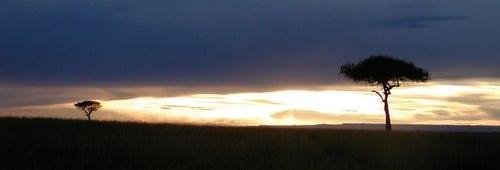.JPG)
Even before we left the US, we knew Christmas in Kenya was going to be different. While we were celebrating Christmas 2007 in the US and then on a quick trip to Ireland, we made a
game of which Christmas songs would be least appropriate in Kenya:
"I'm Dreaming of a..." Nope.
"Jingle bells, jingle bells, jingle all the way! Oh what fun it is to ride in a
one horse open..."Nope.
"Chestnuts roasting on an open fire, Jack Frost..." Nope.
On the other hand, most of the songs about the FIRST Christmas still work:
Silent Night, Joy to the World, Away in a Manger....few of the songs about the birth of the Christchild are bound by the Western image of snow and cold. Maybe that's at least partially because the "first" Christmas happened in the Middle East, probably in the spring since the shepherds were watching herds of sheep including lambs.
We're thrilled that we will have five family members with us for Christmas: Mark's Dad Jay, second-oldest son Andrew and his wife Birge, and favorite daughter Rachel and her boyfriend Rich will all be here for visits from a couple of weeks to a month. We'll do some of the usual things we do with visitors, but it will be great to spend the Christmas season together.
What's Christmas like in Kenya? Each week we have four students or four faculty members to lunch at our house, and for several weeks we've been asking people this question. The answers depend a little on the age or on the tribal background of the respondent, but there are
.jpg)
some general themes: Certain kinds of food that were rare on a daily basis were featured on Christmas Day: chicken and rice and chapatis (a kind of East Indian burrito, pictured nearby).
Young men would go from door to door in the small, closely knit villages and ask for food that was cooked in the field by the young people as a special Christmas feast--kind of like "trick or treating for protein"! While it was rare for there to be many gifts to open, everyone got new clothes. Often, people would attend a village church service, led by a lay pastor since ordained ministers were rare in the small villages. Some people, if they thought their clothes were especially nice, would attend multiple church services to let their neighbors see how nice they looked.
What we see around us now is an interesting mixture of old and new customs, African and Western elements. The "Nairobi Christmas" is usually the more Western, especially if families
.JPG)
have young, media-influenced children. There will probably be a Christmas tree (like the one in Ya Ya Shopping Centre also pictured nearby) and other decorations. There will probably be more Christmas presents.
The "up country" Christmas is usually more traditionally Kenyan. Most Kenyans have property in the rural areas--called "up country" wherever they are located. City Kenyans travel to enjoy the rural property, see elderly relatives, and slaughter and eat a goat. Christmas decorations are less common. Often, the most senior relative may give a speech of inspiration and advice at the end of the family celebration.
There's a third variation of Christmas that we are a small part of: the "expatriate Christmas." Several students on the ANU campus will not be able to go home for Christmas: Okon from
Nigeria; Gift and Constantino from Zimbabwe; a pastor named Agnes and her family from the Democratic Republic of the Congo. We'll plan to have an on-campus expatriate Christmas. Often, these students are far away from family, have limited funds, and are cut off from the traditions of their home countries. We'll have lots of family around us, so we're feeling very happy about our Christmas, but as the news here is full of stories of violence in the Congo and cholera in Zimbabwe, we'd appreciate your prayers for these expatriate Nazarene students and their troubled countries at Christmas time.
So do we miss the Western Christmas? Well sure, a little bit, but to make up for that we often
feel we are seeing the "real" Bible stories laid out before us--shepherds tending flocks of sheep
.JPG)
and goats; pairs of figures walking down rock-strewn trails, robes flapping in the breeze; herds of camels eating the leaves of acacia trees.
The Lord is teaching us not to alter our vision of Christmas, not to abandon our affection for snow and evergreens, but to expand our vision of Christmas and to use the timeless elements of Kenyan culture to reconnect to the quiet, star-lit and non-Western realities of the First Christmas.
As we move more fully into the Christmas season, we want to thank each of you who have been part of the journey we have taken this last year. It took us from the violence at the beginning of the year in Kenya, through some personal challenges to the joy and excitement of Christmas with family. As we close, we'd like to wish each of our friends and blog subscribers a very Blessed Christmas, and to share with you some quotations about the religious and cultural aspects of the Christmas season:
- The spirit of Christmas needs to superseded by the Spirit of Christ. The spirit of Christmas is annual; the Spirit of Christ is eternal. The spirit of Christmas is sentimental; the Spirit of Christ is supernatural. The spirit of Christmas is a human product; the Spirit of Christ is a divine person. That makes all the difference in the world. Stuart Briscoe
- They were all looking for a king To slay their foes, and lift them high; Thou cam'st, a little baby thing That made a woman cry. George Macdonald , British religious writer.
- Remember, if Christmas isn't found in your heart, you won't find it under a tree. Charlotte Carpenter.
- A lovely thing about Christmas is that it's compulsory, like a thunderstorm, and we all go through it together. Garrison Keillor
- At Christmas, all roads lead home. Marjorie Holmes
- The three grand essentials … in this life are something to do, something to love, and something to hope for. Joseph Addison
MERRY CHRISTMAS! MARK AND NANCY





1 comment:
Great post... really loved the quotes, but most of all your honest dive into an unfamiliar yet, surprisingly familiar Christmas! Peace be with you this Advent Season.
Post a Comment